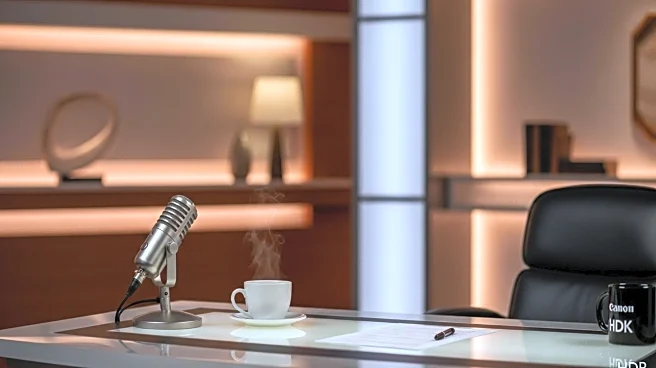What's Happening?
Late-night host Jimmy Kimmel recently concluded his series of shows in Brooklyn, where he took the opportunity to mock President Trump. During his monologue, Kimmel referenced the ongoing government shutdown and made a humorous connection to Trump's past association with Jeffrey Epstein. Kimmel joked about the timing of the release of Epstein-related files, comparing it to the recent sentencing of music mogul Sean Combs. He further highlighted a statue depicting Trump and Epstein, which had been removed by U.S. Park Police but was humorously 'celebrated' by Kimmel as a 'beautiful piece of art.' The statue, according to Kimmel, humorously depicted Trump and Epstein holding hands in a playful manner.
Why It's Important?
Kimmel's monologue underscores the intersection of entertainment and politics, where late-night hosts often use humor to comment on current events and political figures. The government shutdown, a significant political issue, is being used as a backdrop for satire, reflecting public sentiment and criticism of political leadership. Kimmel's reference to Epstein, a controversial figure linked to many high-profile individuals, including Trump, highlights ongoing public interest and scrutiny over these associations. This type of commentary can influence public perception and discourse, especially as it reaches a wide audience through popular media platforms.
What's Next?
As the government shutdown continues, it is likely that late-night hosts and other media figures will keep using humor to address political issues and figures. This ongoing commentary can shape public opinion and potentially impact political discourse. The administration may respond to such portrayals, either directly or through policy actions, as public pressure mounts. Additionally, the release of any new information related to Epstein could further fuel media coverage and public interest.
Beyond the Headlines
The use of humor in political commentary raises questions about the role of media in shaping political narratives. While satire can be an effective tool for critique, it also blurs the lines between entertainment and news, potentially affecting how audiences perceive factual information. This dynamic highlights the importance of media literacy and the need for audiences to critically evaluate the content they consume.










